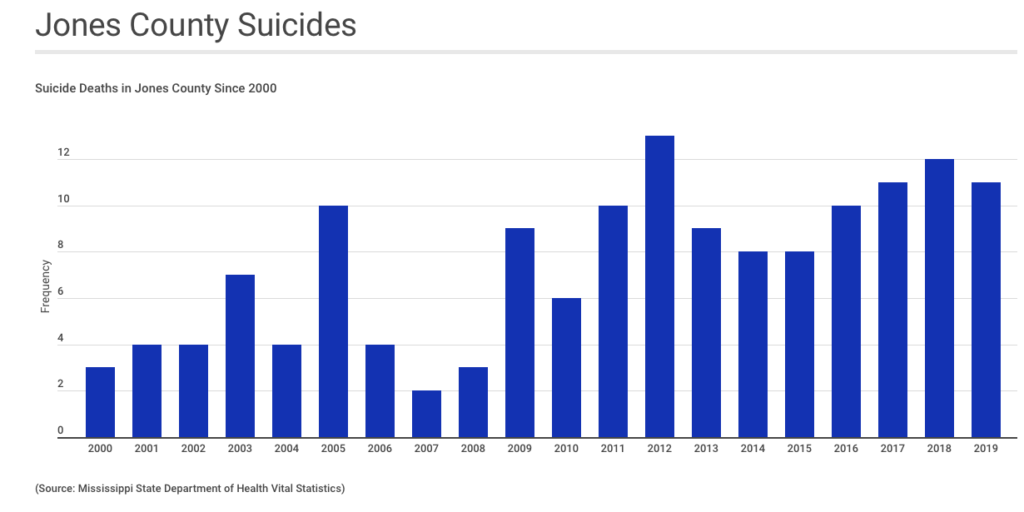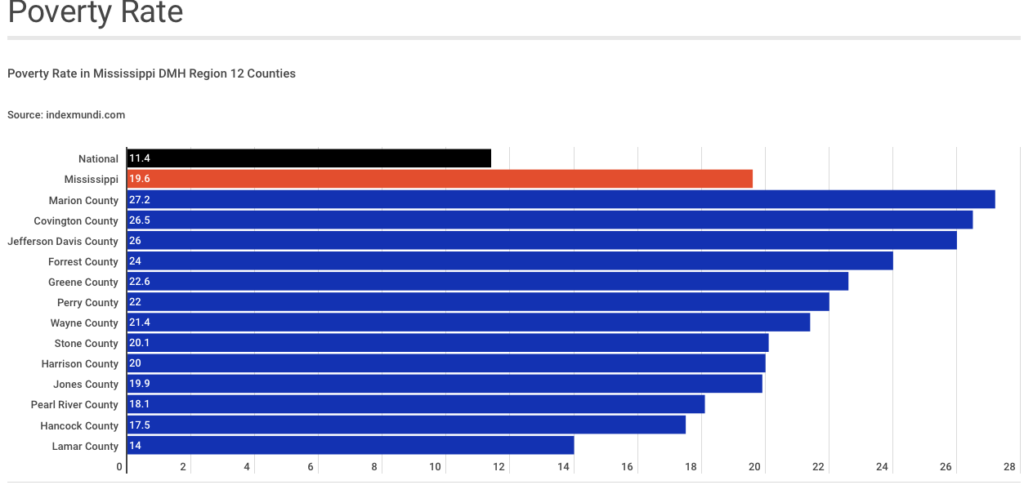Extras News
Jones County Sees Alarming Spike In Suicides, Mental Health Emergencies

By Jared Redding, Michael Gross
Four suicide calls to the Jones County Sheriff’s Department (JCSD) over the course of one “Bad Weekend” in late July highlights the rising mental health crisis that is gripping Jones County, a southern Mississippi county of roughly 68,000 people. As Sheriff Joe Berlin, recounted the tragic events of this weekend with the calm demeanor characteristic of a seasoned law enforcement leader, his concern over the escalation in these types of calls was evident.
“We are in an uphill battle,” Berlin said. “The pattern that I see is that it’s going to get worse.”
Suicides in Jones County have nearly doubled from an average of 5.0 suicides in the decade from 2000 to 2009 to an average of 9.9 suicides in the decade from 2010 to 2019 as reported in the Mississippi State Health Department Vital Records.

In his 23-year law enforcement career, Sheriff Berlin has never seen anything like what he and his deputies are currently dealing with on an increasingly frequent basis. He estimates that mental health-related calls in the form of suicide threats, drug overdoses and cases where someone has just “snapped” have risen since 2020 to comprise about 20 to 25 percent of the total emergency calls to his office.
Dr. Rhonda Smith, a psychiatric therapist for South Central Regional Medical Center reported that her office is also seeing an increase in calls for depression and anxiety. She attributes a portion of the rise in cases to the coronavirus pandemic.
“We’ve been told for the last 18-24 months that we have to be afraid. That makes anxiety a whole lot worse,” Smith said.
Dr. Smith listed other factors connecting the pandemic to the increase in depression and anxiety including social isolation and grief over the deaths in the community, but she emphasized the impact of lost jobs.
“Financially, people are struggling and I think that has a lot to do with depression and just despondency,” Smith said.
Lack of access to mental health services is a contributing factor to the current mental health crisis across the nation. Just a few years prior to the pandemic, a 2018 survey by the National Council on Mental Wellbeing and the Cohen Veteran’s Network reported a high demand for mental health services. Approximately 56% of Americans reported the desire to seek services for themselves or loved ones while 74% did not believe mental health services were accessible for everyone. The survey also emphasized a disparity in access to mental health services based on income and location.

Dr. Smith confirmed the problematic issue of access to mental health services for low-income individuals in Jones County for ongoing treatment. She explained that because the majority of therapists in the area only accept patients with certain insurance, citizens without private insurance are limited to receiving mental health services from the community mental health center, which in turn has limited resources with which to provide those services.
The poverty rate in Jones County is 19.9 percent, similar to the average across Mississippi, a state that currently holds the highest rank among poorest states in the nation according to World Population Review, with an average poverty rate of 19.6 percent. Jones County is located within the Mississippi Department of Mental Health’s Region 12 area which has an average poverty rate of 21.5 percent across these 13 counties.

The Culprit – Reasons for the crisis in Jones County
“People just get to the point where they don’t think they’re going to make it and they just lose their mind,” said Berlin
Detective J.D. Carter of his Narcotics Division agrees.
“You got people that were working, making this amount of money. COVID hit and they got laid off and now they’re losing vehicles, property, houses, and still trying to feed their family. And that adds a lot of stress. And then something snaps.”
Carter added that many of the recent crisis calls to the JCSD have been drug or alcohol related as many have turned to using these substances to handle the stress. For habitual users, he has also seen a change in ability for many to handle both the drug or alcohol use and the added stress.
This tendency to self-medicate has compounded the mental health crisis, not only for Jones County citizens, but also for the county’s first responders. According to Sheriff Berlin, the problem is in part due to the lack of mental health services for the county’s poorer citizens. There isn’t a simple solution to the problem, he explained, because doctors send bills and people who don’t have the money to pay a doctor bill don’t get the help they need.
“I mean, they’re already in a crisis. You tell them it’s going to cost them $2,000 to get help and what do you expect them to do? They’re going to go out there and get themselves some street drugs to self-medicate. And the next thing you know you’re picking one up because they’re dead. They overdosed or they are as high as a kite and jumped on somebody and killed them or assaulted them. And it’s all because they didn’t have the money to get some help,” Berlin said.
For many with the lack of ability to pay private mental health providers, options for mental health care are severely limited to hospital emergency services or a state-funded regional mental health center or crisis center. But with the high number of COVID-19 cases in medical facilities since the onset of the pandemic and the budget cuts and staff shortages associated with state-funded facilities, local law enforcement agencies have increasingly been counted on to handle mental health emergencies in the field.
“There are only so many therapists,” Smith said. “For the number of people that need help, there aren’t enough providers.”
Law Enforcement – How the Sheriff’s Department is dealing with it
“It’s part of the job,” Berlin said, explaining that most of his officers are trained in crisis intervention. “We can determine when we go out on the scene whether a person is having a mental breakdown or if the person is under the influence of narcotics or alcohol.”

He added that based on the assessment, if a person in the mental health crisis is determined to be a danger to self or others, deputies have two options – call in the Mobile Crisis Response Team (MCeRT) or take the person to jail – because the first priority of the JCSD is to protect all the citizens of Jones County. Berlin emphasized “all” when referring to the citizens of Jones County, alluding to the fact that a person in crisis presents a danger also to others in the immediate area.
According to Dr. Smith, MCeRT responders determine whether the person in crisis needs to be admitted to a hospital somewhere to be stabilized or can be handled on an out-patient basis. She further explained that there are currently only two places that MCeRT can take people for mental health stabilization. WestWay Behavioral Health, located in Laurel, is the only state-funded crisis stabilization facility in the region. The second option is Forrest General Hospital, located in Hattiesburg, an hour-and-a-half ride in an ambulance.
The local hospital, South Central Regional Medical Center, does not offer emergency psychiatric services, although individuals may seek out the emergency department there on their own as they would for any medical emergency.
Dr. Smith emphasized the importance of following up after a crisis and of providing continuation of treatment to avoid going from crisis to crisis. “It’s important to have people get in treatment and to stay in treatment,” she said. “But then we also need to have the ability to provide that help when the people ask for it and that’s a tricky situation.”
Berlin concurs. He doesn’t want to take people to jail but often doesn’t have a choice given his duty to protect the citizens of Jones County in conjunction with the lack of local crisis services for mental health issues.
“They’re the ones that we refer to,” he said of the local mental health crisis services. Berlin further lamented that often when he needs them to intervene they respond back that they can’t take anyone due to lack of resources.
“So again, they have to go to jail,” Berlin said. “You can’t leave them at home when they’re going through a situation where they need help. If you do then you’re going to go back out there and work a suicide.”
Berlin further emphasized his point by relating that he currently has a man who has been in jail awaiting an inpatient bed at the Mississippi State Hospital.
“He was number 633 on the list. He’s been in jail for two years. In my jail for two years waiting on a bed at a mental health place. So, I mean, what do you expect us to do?”
The Future – What now?
The spike in suicides and other mental health-related crisis calls in Jones County has cast a spotlight on the rising mental health needs of the residents in this area, possibly due in part to the recent pandemic but also due in part to the lack of access to mental health resources for many of the county’s citizens, a reflection of the national mental health crisis. This spike in calls for the Jones County area has also illuminated the pressure placed on first responders, such as Sheriff Berlin and his JCSD deputies, who are counted on more and more frequently to serve and protect fellow citizens who are affected by mental health-related crises.
Despite the Jones County Sheriff’s Department’s motto, “Focused on the Future,” Sheriff Berlin and his deputies will continue to remain focused on serving in the present as they work toward becoming even better equipped to handle the mental health-related emergency calls coming in to the JCSD.
“We’re not trained doctors, so however they handle it, they handle it…They’re the ones we refer to,” stated Berlin. “But every day we try to get better equipped to be able to handle situations. There are always classes that we can send our guys to. There is always training.”
When questioned about the JCSD motto, Sheriff Berlin said that in order for him to focus on the future for Jones County and the children growing up within it, the current problem has to be solved. And he and his deputies are there to solve it – one crisis at a time.





































